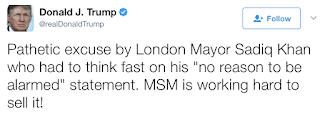Why Does it Matter That America Is Now a Villain?
by Neil H. Buchanan The annual Independence Day holiday festivities provide an opportunity to reflect on the unique place that the United States holds in world affairs, for better and for worse. How much worse has it become because of Donald Trump? And does it matter? Back in 2008, as the Bush era was ending and we were attempting to assess the disturbing legacy of the Bush/Cheney Administration -- the falsified case for the Iraq invasion, the horrors at Abu Ghraib prison that had been perpetrated by U.S. Army and CIA personnel, the ongoing human rights disaster that was (and still is) the Guantanamo Bay prison, and on and on -- it had become obvious that the reputation of the United States as a beacon of hope had taken a huge hit in the eyes of the world. In December of that year, I wrote a short essay, " Our Reputation Matters ," expanding on an editorial in The New York Times that had argued for closing Guantanamo as a matter of both moral imperative and nationa...

